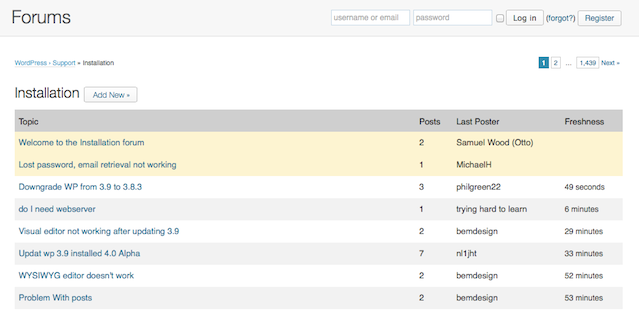How to Represent Yourself in the WordPress Community

Online etiquette is a big deal. This is something that applies to all industries, but since WordPress bloggers and developers make their living online, it’s something they really need to pay attention to. After all, how you conduct yourself in public forums can directly affect your reputation and your ability to acquire new clients.
That’s why I wanted to take some time here to talk about how to properly represent yourself online in general, of course, but with a special emphasis on what you need to keep in mind as a WordPress developer and/or user.
Engaging with Blog Comments
One of the best places to communicate with other people is on your site itself, in the blog comments section. Not only is this a great way to showcase a bit more of your personality, but it’s also excellent for showing that you’re open to feedback and genuinely want to hear what your readers have to say.

There are a few things you need to keep in mind that relate to folks looking to build up a reputation in the WordPress community:
- Be certain you know your stuff. By participating in the WordPress community, there is an assumption you know what you’re talking about. This is why it’s really important to represent yourself and your knowledge level accurately. And when you say you’re open to feedback, mean it. Because if you make a mistake, people will call you out on it. It will happen.
- If you ask questions, expect answers. I tend to end my blog posts with a question to encourage discussion in the comments section. I do this knowing that there’s the possibility that I’ll receive negative comments or criticism. When you put yourself out there online, it’s just the name of the game, so you have to be prepared for that.
- Be gracious when you receive criticism. Again, it’s bound to happen at some point, so make sure you accept it positively. Lashing out at people who criticize you won’t net you any friends in this business — or any business, really.
- Respond to everyone. Of course, I’m not talking about trolls or people trying to blatantly get your ire up. Rather, you should respond to comments left by anyone who’s being sincere — even if he or she is saying something negative about what you wrote. This is doubly important if a reader points out an error. Subjects related to WordPress development are quite technical. Errors can cause major problems so be receptive to the feedback and admit fault when appropriate.
- Lookout for sneaky spam. A rising issue on blogs in general is non bot-generated spam. There are plugins aplenty to battle bot-generated spam like Akismet and Jetpack. But it’s much harder to automatically filter user-generated spam. Pay careful attention to what people say and be mindful to only approve those comments that appear to be 100% legitimate.
Engaging on Social Media

Whether you work as a WordPress developer or simply use the CMS for your site, it’s important to be active on social media. Why? Because this is one of the major ways you can drive traffic to your site. But there are a few “rules” you need to abide by in terms of conduct:
- Select a social media management tool. While not directly related to conduct, picking a good social media management tool will make it a lot easier for you to see when people engage with you so you can react more quickly. Basically, it keeps your social accounts organized so you can spend more time talking with people and less time keeping tabs on where discussions about you are happening.
- Reach out to experts. There are many WordPress gurus on social media, and if you want to expand your reach, you’ll need to engage with them directly. Of course, you don’t want to be rude or blatantly promotional. Instead, follow what these experts say and participate in discussion. Be a human and that alone will get you pretty far.
- Share other people’s content. This is a social media marketing technique called content curation and it’s actually really important for both establishing yourself as an expert in your field as well as catching the attention of other experts and those with an interest in WordPress.
- Avoid public meltdowns. This applies across every industry – unless you’re in entertainment, I suppose – but it’s a good idea to keep your social media accounts free of public meltdowns. Not only does it convey an unprofessional appearance, it could damage your reputation long-term, especially if your meltdown is about a previous client or some such. If you don’t want your current client roster list knowing about something, keep it off social media. End of story.
WordPress Community Etiquette

While everything I’ve discussed so far relates directly to the WordPress community at large, there is an actually dedicated space for WordPress users and developers on the WordPress.org Forums. Many other sites out there have support forums where people can ask and answer WordPress-related questions, I know, but I think in this case it’s a good idea to go to the source.
Since so many people frequent the forums each day, odds are good that someone’s asked a similar question before, if you’re having an issue. And if you just want to help out, well, there are plenty of WordPress newbies looking for your insights! A few tips for engaging there:
- Be authoritative. It’s one thing to answer someone’s question but since anyone can sign up and post, it’s important to make sure your remarks stand out. Don’t gloat or lord your knowledge over anybody. A little humility is appreciated. Just indicate your experience in a contextual way. It’ll result in your posts being taken more seriously.
- Admit when you’ve got it wrong. Make a mistake? No problem. Apologize, try to correct the problem, and move on.
- Be thankful. If you’re stumped on something and a kind person offers assistance, be sure to thank them for taking the time to answer your question. Everybody likes a team player and if you want to build a solid industry reputation, being consistently thankful and considerate can get you far.
People involved with WordPress are a passionate bunch. They take it seriously. So you need to keep that in mind when engaging with your fellow enthusiasts and developers. Emotions can run high when dealing with something people care so much. People’s livelihood is wrapped up in WordPress, after all. Even so, if you receive criticism and feel the urge to get embroiled in an argument, resist! It won’t do anything to further your reputation and could actually hurt you if you’re not careful.
All that being said, the WordPress community is a largely welcoming place. Experts and newbies alike flock around this platform they love. People help each other out. And since it’s open-source, community members stand a real chance to help shape the platform in its future incarnations. Which — if you ask me — is pretty cool.
So, do you have any special rules you like to follow when engaging with the WordPress community. Do these rules differ for you while conversing on the dedicated forums, in blog comments, or on social media? I’d love to hear what you think!




Thanks Tom for sharing this tips. I’d like to add one more thing – http://www.gravatar.com. Since you’re involved in WordPress community and for better communication it’s good to register the account at Gravatar. I found it really convenient when making comments.
Thanks for sharing Tony!